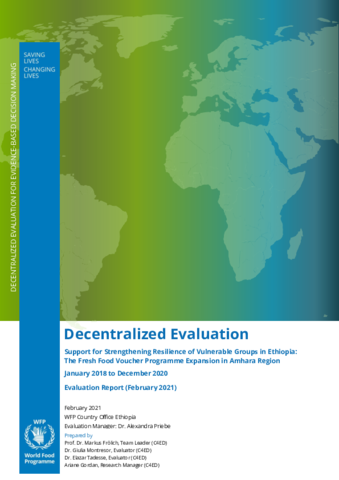
Evaluation Subject: This endline activity evaluation covers the FFV Programme FFV Programme Expansion 2018-2020 in Amhara region. The programme was implemented in seven woredas (Habru, Raya Kobo, Dessie Zuria, Dawa Chefa, Kalu, Mekdela, Seqota) and targeted 27,000 households. The expansion was funded by a 7 million Euro grant from BMZ/KfW. The FFV programme’s main objectives are to 1) increase the dietary diversity of pregnant and lactating women (PLW) and children under two, 2) stimulate the local fresh food market and 3) strengthen social and behavioural change to generate more demand for fresh food in seven woredas in the Amhara Region. To reach these objectives, the programme includes a digital voucher redeemable for fruits, vegetables, and eggs at local traders, SBCC activities and retailer engagement and training.
Objectives and Scope of Evaluation: This endline evaluation follows two objectives: accountability and learning. The evaluation was conducted in the midst of the COVID-19 pandemic and accordingly faced various challenges. The evaluation was designed to assess the FFV programme against the following evaluation criteria: relevance, effectiveness and efficiency, and sustainability. In order to respond to these questions, a mixed-methods evaluation was conducted using quantitative and qualitative data sources. The evaluation was not able to make any assessments of the causal impact of the intervention, as no credible counterfactual could be established.
Key recommendations from the evaluation included :
Recommendation 1: WFP should strengthen technical IT capacities for smooth registration, transfer and redemption process. Adaptations to reliability of mobile phone network to be considered.
Recommendation 2: WFP should regularly assess the adequacy of transfer value in light of price fluctuations, and possibly of the beneficiary households’ affordability.
Recommendation 3: WFP should consider conducting an impact evaluation with control group design in order to rigorously assess causal attribution of the, so far, promising results of the pilot programme.
Recommendation 4: Trade authorities, with WFP support, should strengthen accountability mechanisms for traders at the local markets.
Recommendation 5: WFP should focus awareness raising activities on nutrition for PLW and consider gradual phasing out.
Recommendation 6: WFP should investigate interactions with other WFP and government programmes (such as the Productive Safety Net Programme transfers and home gardening programmes).
Recommendation 7: Given the importance of gender sensitive programming, WFP should continue to investigate interactions and possible synergies with other governmental and private sector actors in order to reinforce the Digital and Financial Inclusion of Women through phone-based voucher programmes.
